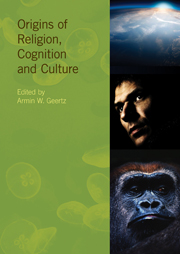Book contents
- Frontmatter
- Contents
- Contributors
- Introduction
- Part I EVOLUTIONARY SCENARIOS
- Part II COGNITIVE THEORIES
- 11 Cognition and meaning
- 12 Wittgenstein and the naturalness of religious belief
- 13 “Peekaboo!” and object permanence: on the play of concealment and appearance in cognition and religion
- 14 Yogācāra Buddhist views on the causal relation between language, cognition and the evolution of worlds
- 15 A resource model of religious cognition: motivation as a primary determinant for the complexity of supernatural agency representations
- 16 The recognition of religion: archaeological diagnosis and implicit theorizing
- 17 Religion and the extra-somatics of conceptual thought
- 18 Tools for thought: the ritual use of ordinary tools
- 19 Care of the soul: empathy in dualistic worldview
- 20 From corpse to concept: a cognitive theory on the ritualized treatment of dead bodies
- 21 Anthropomorphism in god concepts: the role of narrative
- Index
21 - Anthropomorphism in god concepts: the role of narrative
from Part II - COGNITIVE THEORIES
- Frontmatter
- Contents
- Contributors
- Introduction
- Part I EVOLUTIONARY SCENARIOS
- Part II COGNITIVE THEORIES
- 11 Cognition and meaning
- 12 Wittgenstein and the naturalness of religious belief
- 13 “Peekaboo!” and object permanence: on the play of concealment and appearance in cognition and religion
- 14 Yogācāra Buddhist views on the causal relation between language, cognition and the evolution of worlds
- 15 A resource model of religious cognition: motivation as a primary determinant for the complexity of supernatural agency representations
- 16 The recognition of religion: archaeological diagnosis and implicit theorizing
- 17 Religion and the extra-somatics of conceptual thought
- 18 Tools for thought: the ritual use of ordinary tools
- 19 Care of the soul: empathy in dualistic worldview
- 20 From corpse to concept: a cognitive theory on the ritualized treatment of dead bodies
- 21 Anthropomorphism in god concepts: the role of narrative
- Index
Summary
There is an emerging consensus among current cognitive theories of religion that the detection and representation of intentional agents and their actions are fundamental to religion. By no means a monolithic theory, this is an argument with several separate lines of reasoning, and several different kinds of empirical evidence to support it.
This chapter focuses specifically on the notion that people tend to spontaneously make inferences about gods based on intuitive, ontological assumptions, and on one of the main pieces of evidence that is cited to support it: the narrative comprehension experiments conducted by psychologists Justin L. Barrett and Frank C. Keil (Barrett & Keil 1996; Barrett 1998).
Religion as anthropomorphism
That anthropomorphism is indeed a universal trait of religions the world over has been acknowledged by generations of scholars of religion, but it was anthropologist Stewart Guthrie who first made this fact the backbone of a cognitive theory of religion (Guthrie 1980, 1993, 1996).
In Guthrie's view, religion quite simply is anthropomorphism (Guthrie 1993: 178), and the result of an evolved “perceptual strategy” (ibid.: 41). Just as frogs are prone to see moving dots on a screen as flies, and sea urchins will avoid any dark shadow as if it were an enemy fish, humans too tend to interpret their environment with the “models generated by their most pressing interests” (Guthrie 1996: 418; 2002: 54). And what matters most to humans (and mattered most to humans during the Pleistocene) is other humans.
- Type
- Chapter
- Information
- Origins of Religion, Cognition and Culture , pp. 396 - 414Publisher: Acumen PublishingPrint publication year: 2013



